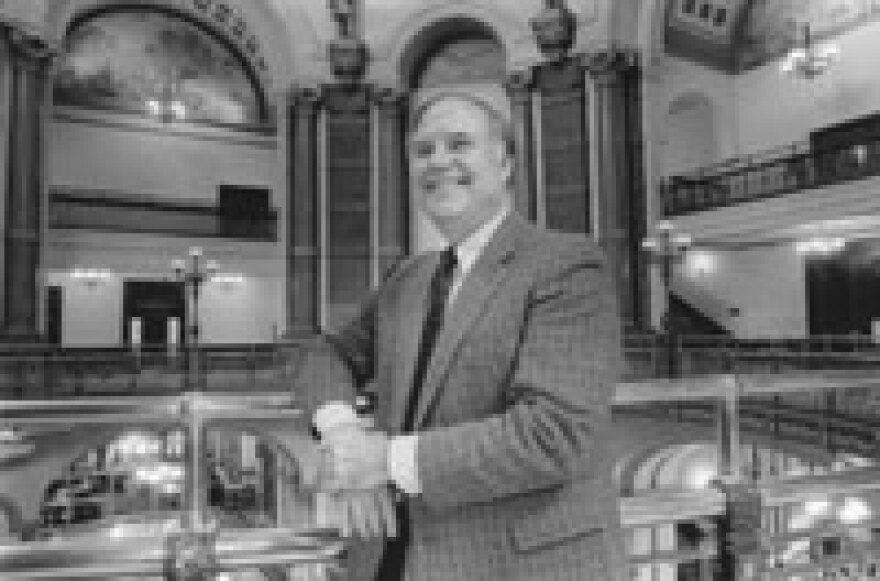Don’t expect the glitz of a rock concert or the fervor of a tent revival, but the Illinois House’s Budget 2006 road show could be a top draw in coming weeks.
Speaker Michael Madigan, a Chicago Democrat, and Republican leader Tom Cross of Oswego are teaming for a series of regional hearings across the state as a leadup to Gov. Rod Blagojevich’s scheduled February 16 budget address to the General Assembly. The hearings are being billed as an opportunity for Illinoisans to learn more about the state’s chronic fiscal woes — Madigan says the state faces a $2.1 billion gap in the coming fiscal year — and for lawmakers to hear what ideas citizens have for dealing with them. But, Madigan stressed while accepting a record 11th term as speaker, “The purpose of these summits is not to promote tax increases.”
The governor, who in the past has accused Madigan of attempting to orchestrate an income tax increase, supported the speaker’s initiative. (Of course, the plan mirrors one of the budget reforms then-candidate Blagojevich proposed three years ago when he called for public hearings around the state on proposed spending plans.)
Still, one is hard-pressed to imagine that the dreaded “T” word won’t come up. Consider who’s likely to show up and what they might say:
• Business groups caution that another round of targeted tax hikes — or, as the administration prefers, “loophole” closings — and fee increases would erode further the state’s business climate, making it harder to attract new investment and create new jobs. Moreover, a trial court already has tossed out one fee increase. That decision was based on grounds that also jeopardize hundreds of millions of dollars generated from other fee hikes levied in the past two years.
• Health care providers warn a growing backlog of Medicaid bills could threaten access to medical treatment, even as the governor — to his great credit — expands eligibility for the working poor.
• Human services advocates decry budget cuts that have resulted in welfare office closings downstate, making it much more difficult for clients to meet with caseworkers.
• Conservationists worry that layoffs at the state Department of Natural Resources will undermine stewardship of the outdoors, from educating schoolchildren visiting state parks to issuing fishing licenses and campsite reservations.
• Public employee unions remind everyone that existing pension benefits are constitutionally guaranteed and that any proposal for a two-tiered system, in which new hires get second-class treatment, would be anathema.
• Corrections officers and civic leaders detail the dangers of closing prisons, both to the physical safety of guards working in overcrowded facilities and to the economic well-being of communities dependent on good-paying jobs.
• Local officials bemoan highway construction delayed and roads not repaired because more than $1 billion of motor fuel tax and license revenue has been siphoned off to pay for other programs.
• Perhaps loudest of all, from the Wisconsin border to the Ohio River, parents and educators lament the precarious fiscal condition of public education in Illinois, where four out of five school districts — including many in wealthy suburban areas — are running in the red, and the gap — chasm? — between what’s available to educate kids in “rich” districts and those in “poor” districts is among the largest in the nation. And this despite Blagojevich and lawmakers boosting state spending for local schools by more than $1 billion the last two years.
The foregoing list should come as no surprise, of course, to anyone who’s been following the news of late, but legislative leaders are hoping the additional media coverage a local hearing garners reaches a broader audience than do reports from the Statehouse.
Nor should legislators learn much new about the ongoing budget travails in the wake of months of pessimistic prognostications from the General Assembly’s Economic and Fiscal Commission and gloomy reports from state Comptroller Dan Hynes.
Legislative forecasters, for example, are estimating that only about $325 million in new revenue will be available for the fiscal year starting July 1, barely enough to cover half of a $633 million, statutorily mandated increase in pension contributions.
The Democratic comptroller, meanwhile, announced last month that the state’s backlog of unpaid bills stood at more than $1.5 billion at the halfway mark of the current fiscal year, as the loss of one-time revenues collected last year offset the modest economic growth seen this year.
While the revelations will be few, the fact-finding hearings are still important for lawmakers as they prepare for what’s sure to be another difficult budget year and one likely to find the governor and lawmakers once again on different pages.
Most significant, the hearings are proactive, allowing legislators to attempt to frame budget issues before the governor weighs in. Historically, the legislature has reacted to the governor’s budget proposal, letting the chief executive define the terms of the debate, as Blagojevich did last year, for example, in painting his plan for higher business taxes as a choice between tax breaks for yacht buyers or money for school kids.
This time, Madigan and Cross have launched a pre-emptive strike, hoping to underscore the problems caused by the loss of one-time revenues, such as $1.5 billion in pension bond sales used to prop up this year’s budget, and mandated spending increases, such as next year’s $633 million pension bump.
The concerns local citizens voice about piling more taxes on business or slicing more deeply into state operations also should help shield lawmakers who differ with the governor’s budget notions from being pilloried as tools of special interests or puppets of the speaker, as happened last year.
Perhaps the brightest hope, however, is that the hearings help lay the groundwork for reforming the state’s inadequate revenue structure, whenever this or some future governor is ready to tackle the problem.
Charles N. Wheeler III is director of the Public Affairs Reporting program at the University of Illinois at Springfield.
Illinois Issues, February 2005





